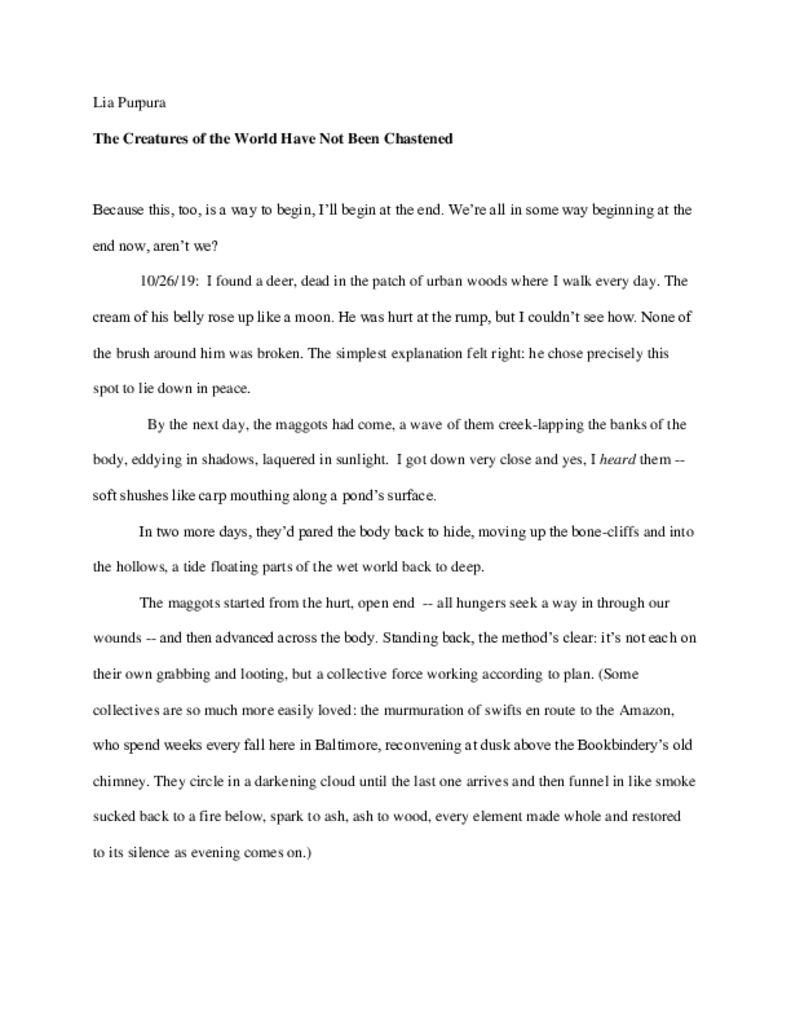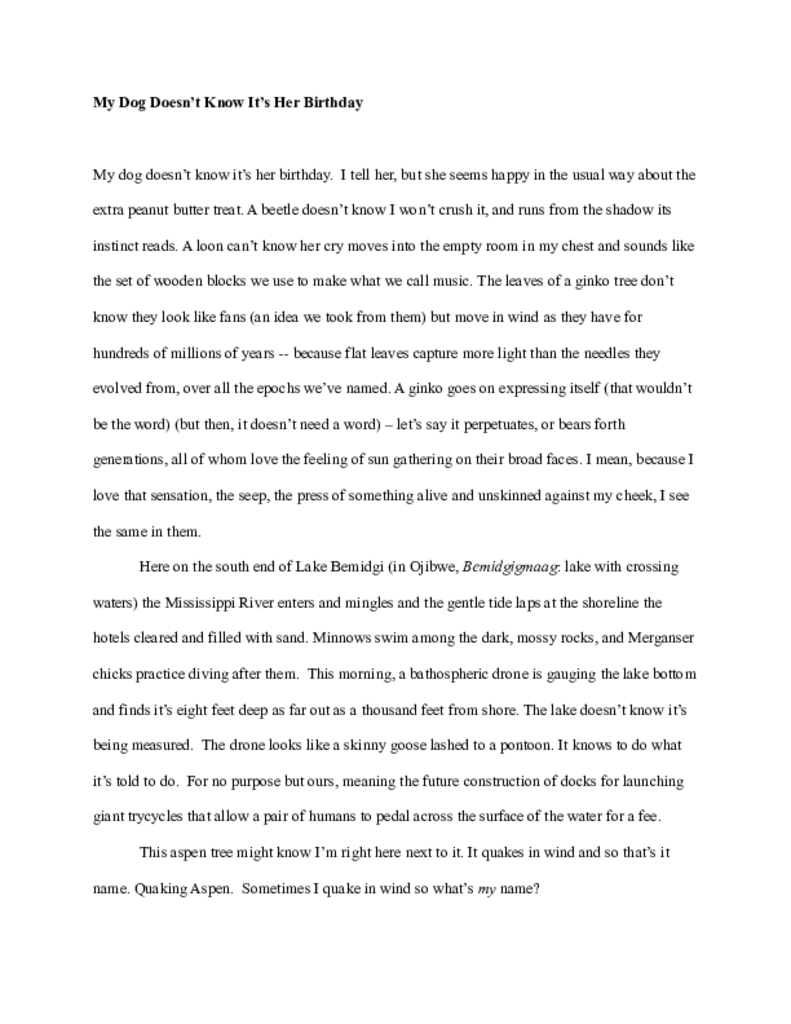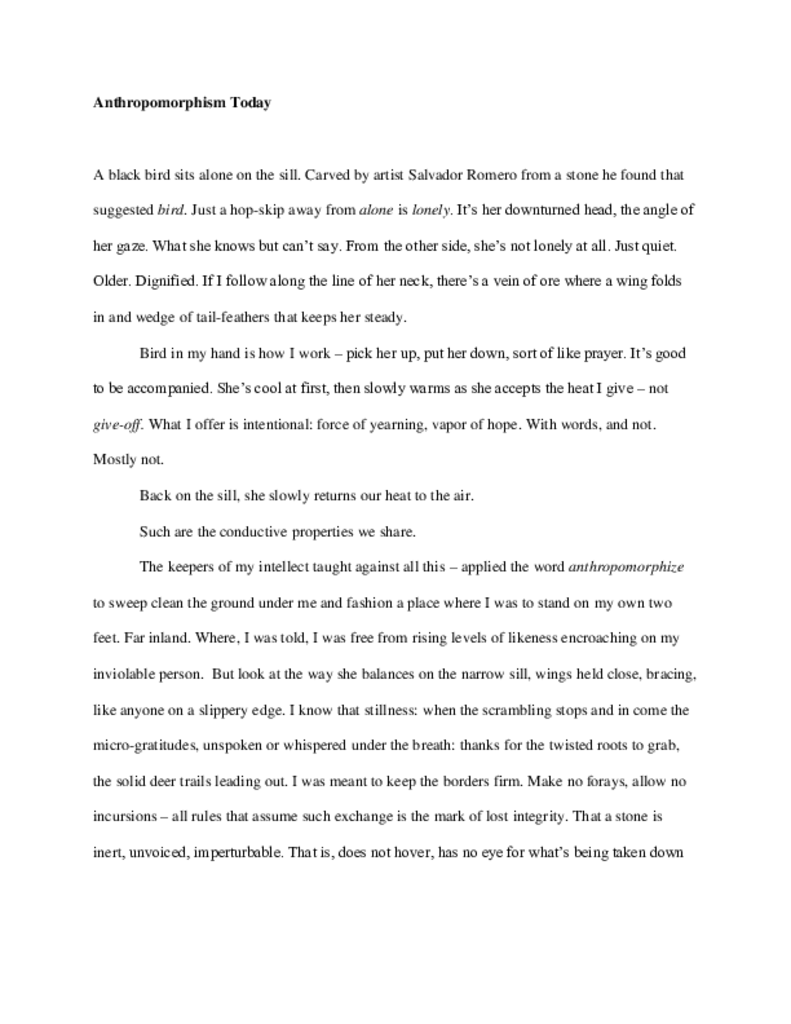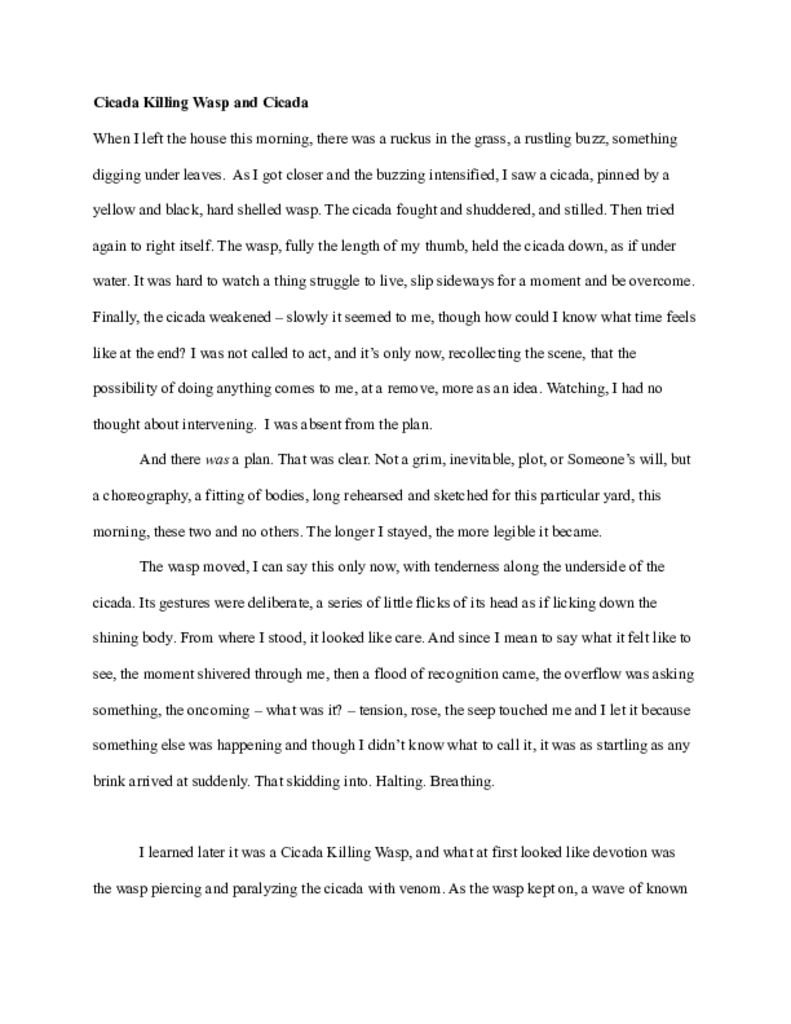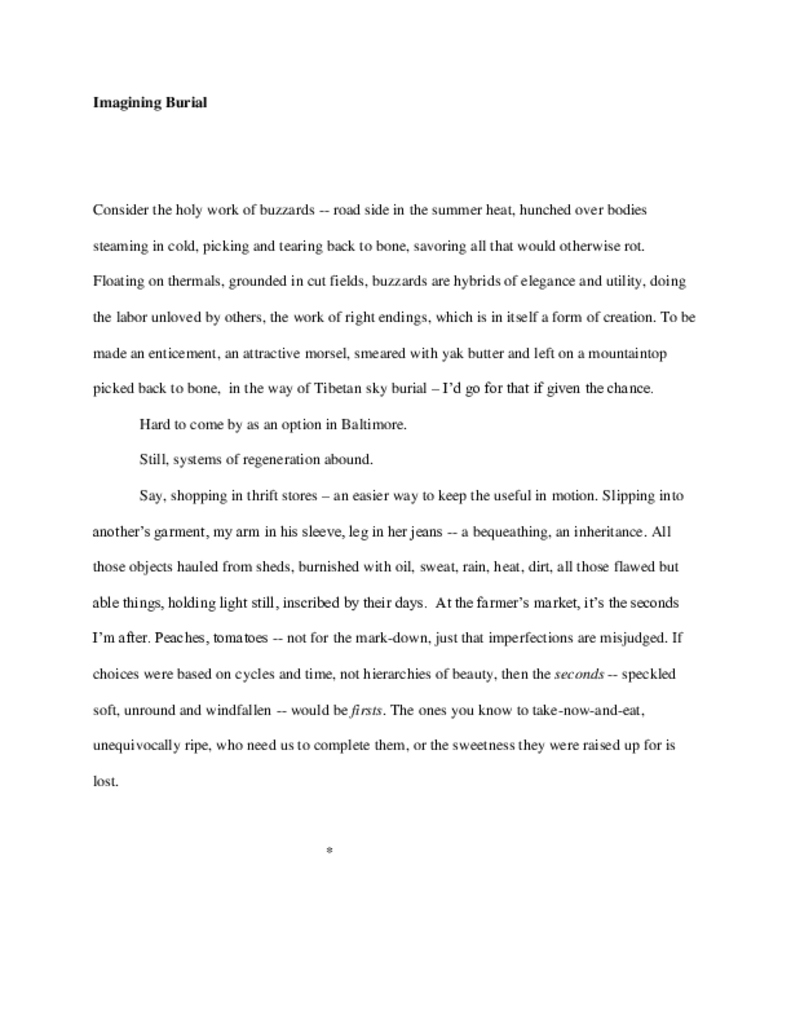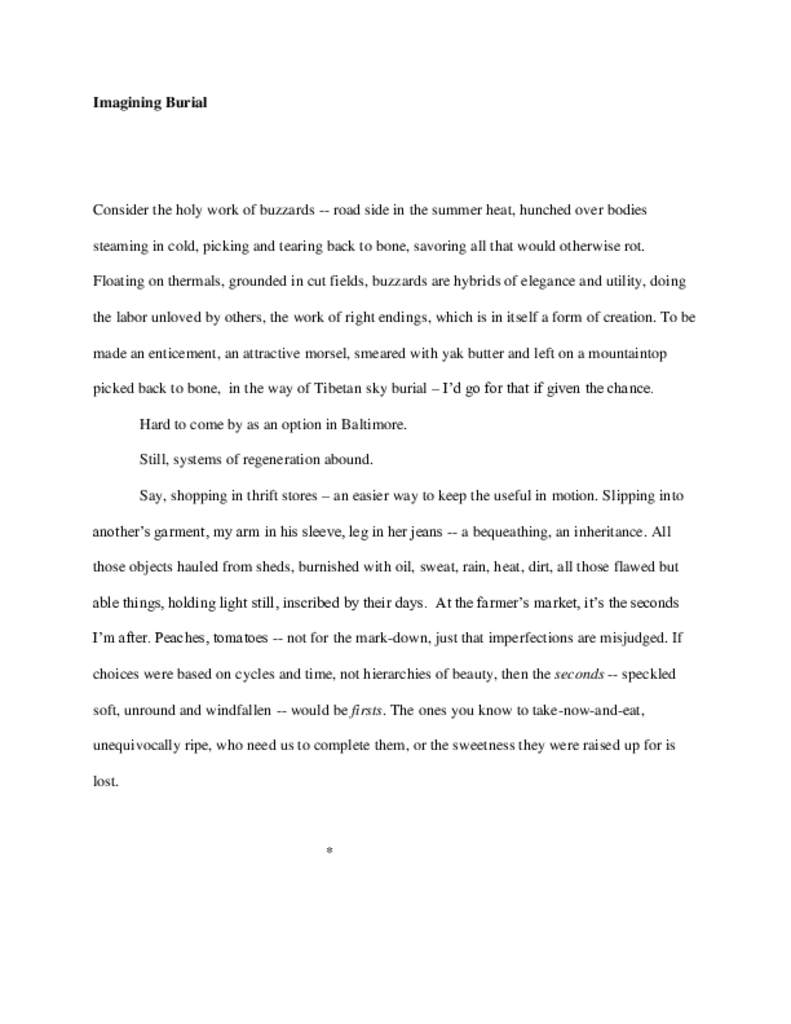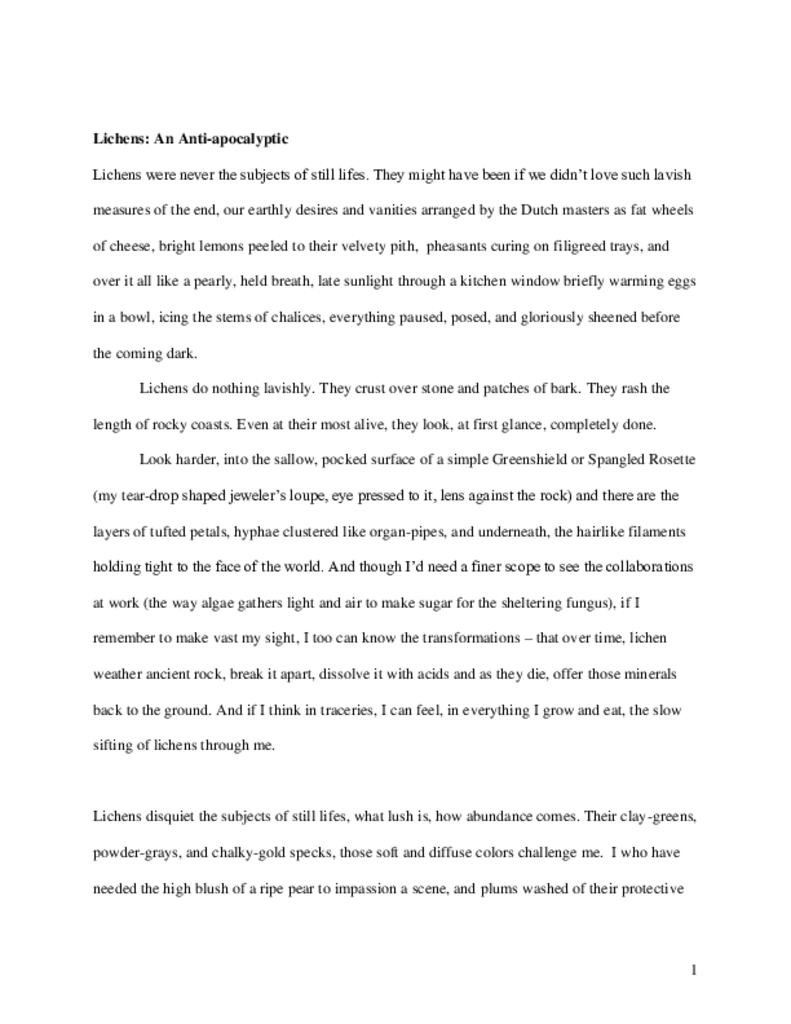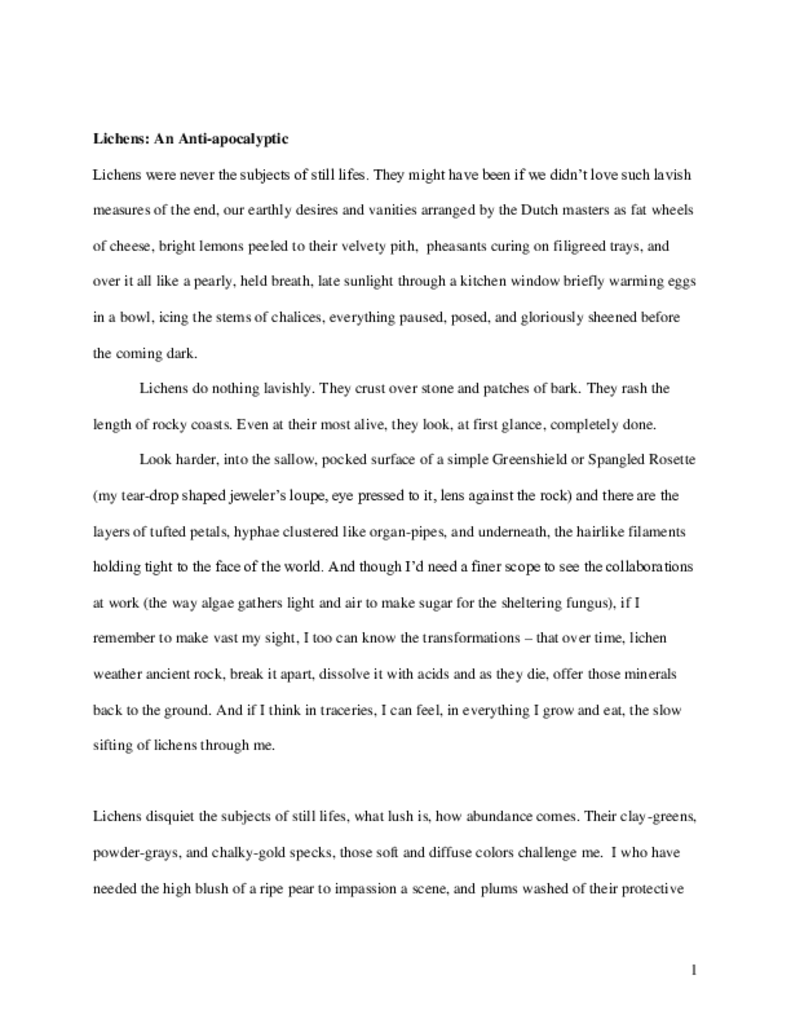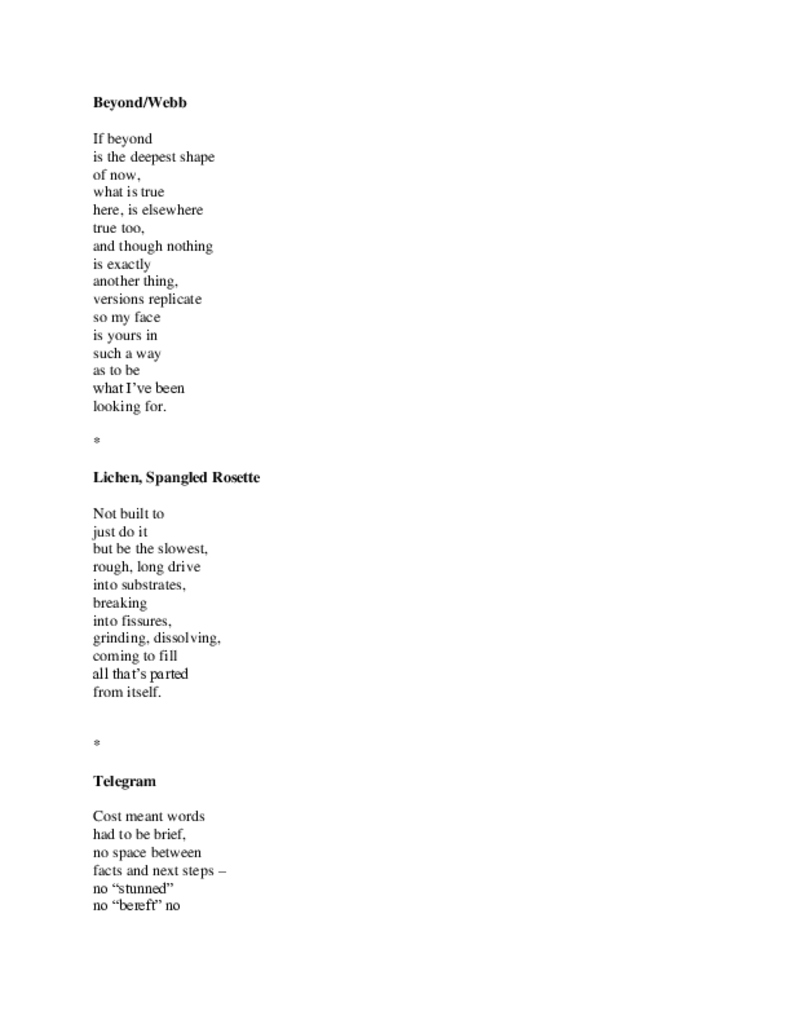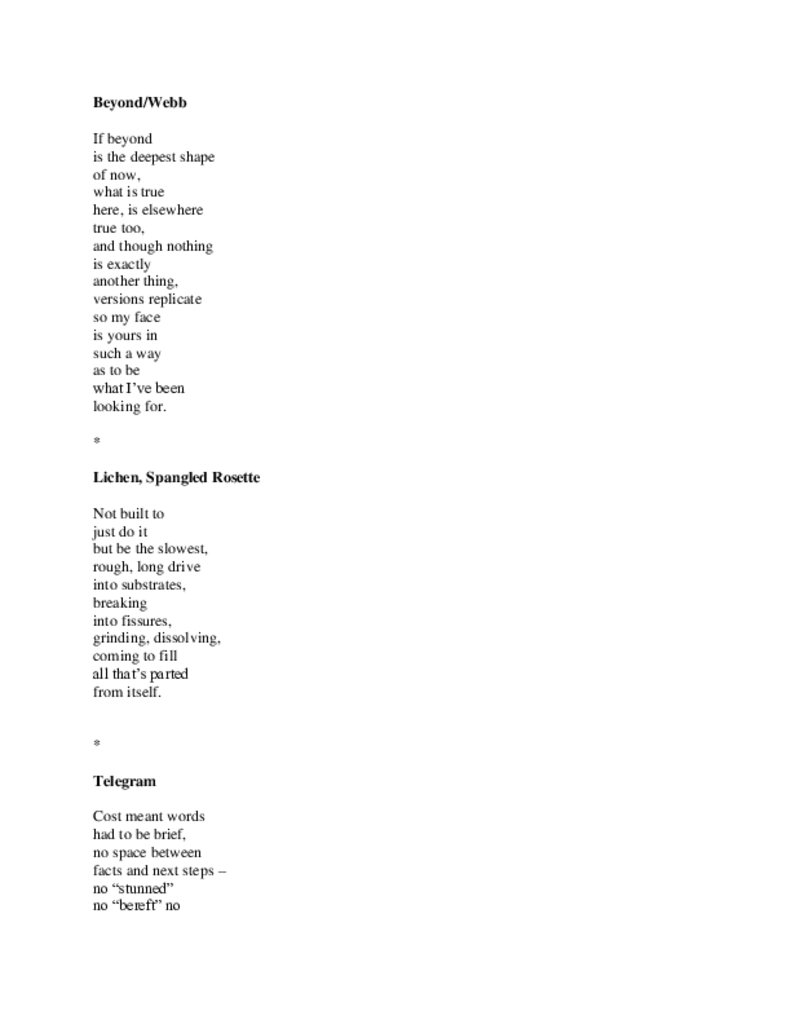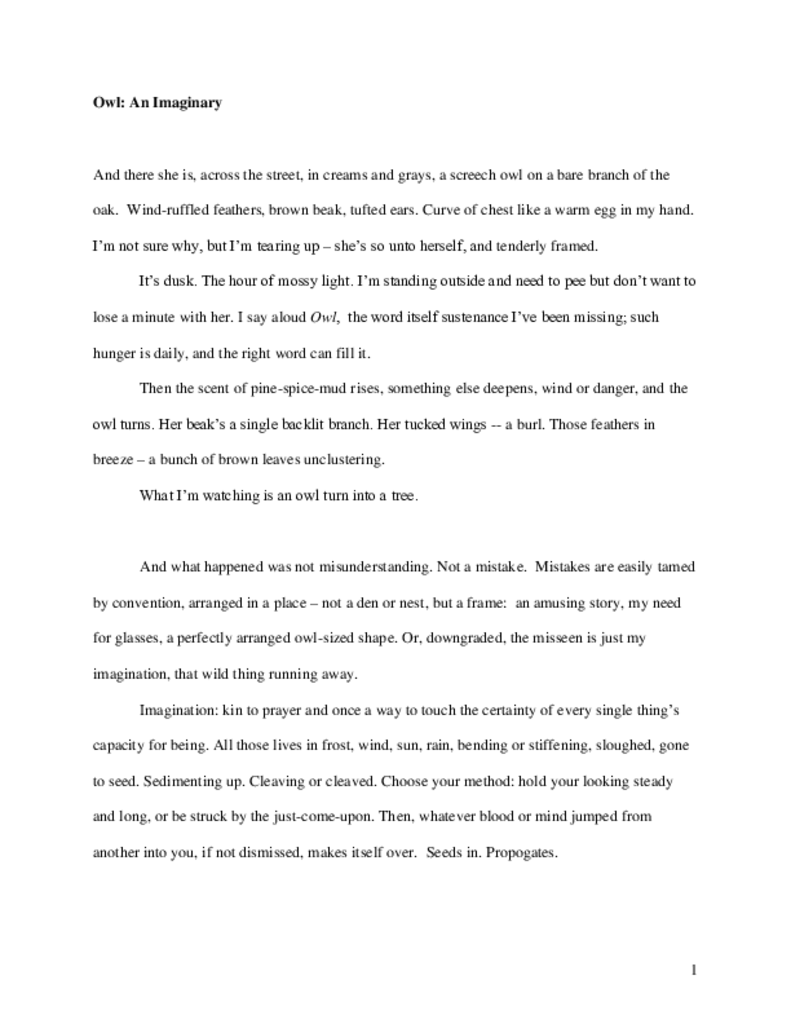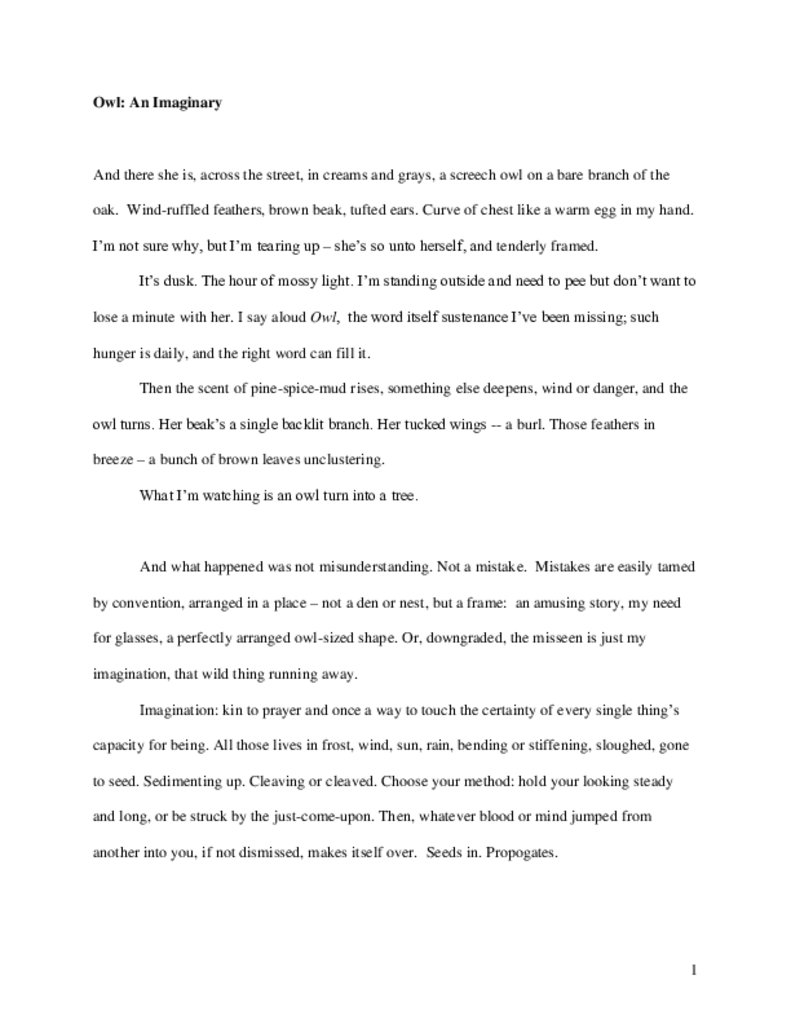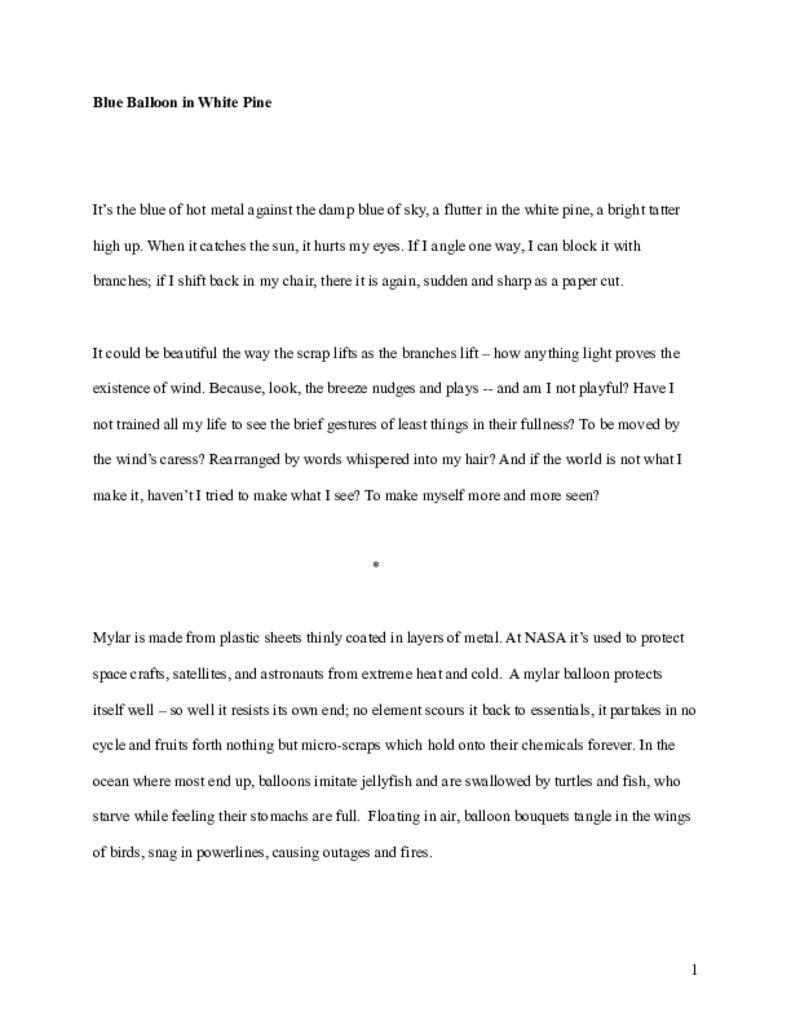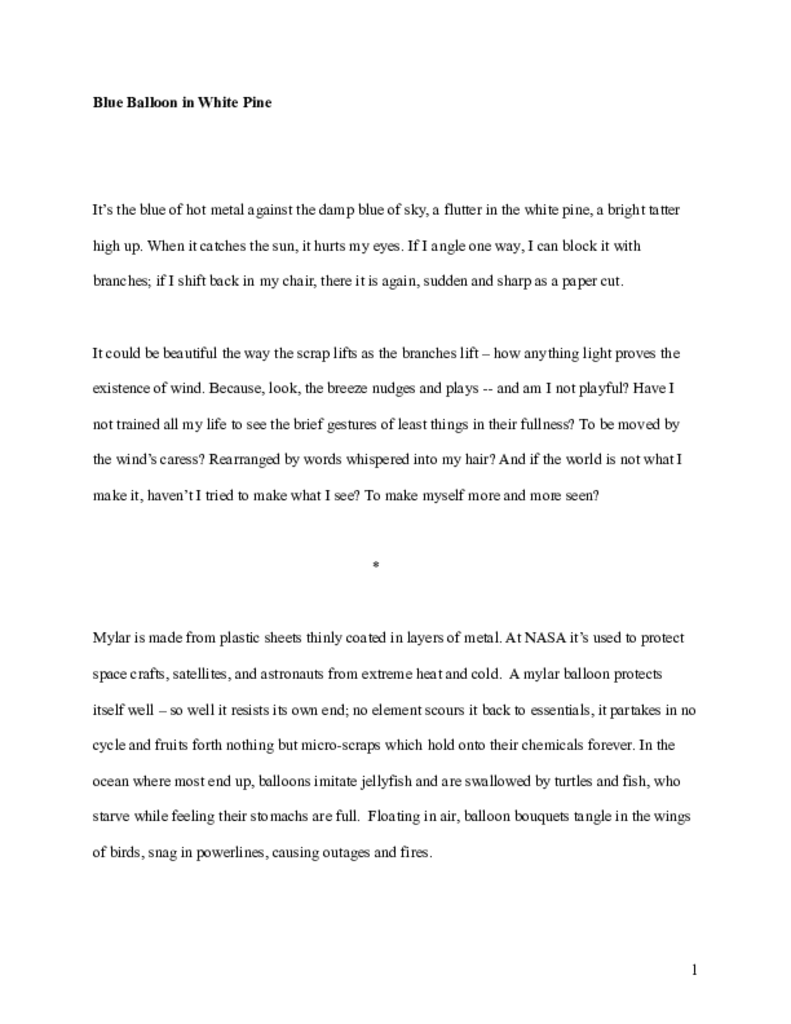Work samples
-
The Creatures of the World Have Not Been Chastened
As an essayist, I'm especially interested in unexpected responses to encounters; lingering in the space between the traditionally degraded and the traditionally beautiful; discovering more capacious definitions of holiness; being in dialogue with the other-than-human world. I continue to seek relationships with lives or life-forms along the margins and in so-called waste-places where sources of light and vitality still have much to say, especially at this moment of shared breakdown and reconstitution. This essay was published in Emergence Magazine, and was awarded a Pushcart Prize.
-
Lia Purpura: My Dog Doesn't Know It's Her Birthday.pdf
This essay is forthcoming in The Southern Review. One morning, on the shores of Lake Bemidgi, the seeds, and then, quite suddenly, the whole of this essay came to me --rooted in the certainty of how much there is to know that's being spoken in other-than-human languages, and how de-centered we humans can be, if we start listening in to the many forms of communication going on all around us. In the short-form essay collection I'm working on now, it's important to me to be in conversation with other writers as well, those I claim as my ancestors; here, Denise Levertov's words come into partnership with my own and help me work more deeply into ideas about likeness and kinship.
-
Lia Purpura: Anthropomorphism Today
So much intimacy with the natural world is educated out of us as we move through school and are taught conventional ways of perceiving and knowing and presenting ourselves. In this essay, I'm facing off with some of the ways that writers are encouraged to lean into the intellect and leave the animate world-- and the imagination required to access it -- behind. In the short-form essay collection I"m working on now, I'm interested in fully reconstituting-- maybe even re-enchanting -- the range of imaginations I use as a writer, leaving none of them behind. This essay was just published in the Harvard Review.
-
Lia Purpura: Cicada Killing Wasp and Cicada
Accepting one's place as a creature among creatures means being open to a full range of experiences in the animal world. As I wrote in this essay, "the act of not turning away, carries within it secret reasons for staying with." I write to figure out what those reasons are. Not turning away from the harder truths makes it possible to crack open a sense of empathy and kinship. Working in short forms allows me to focus very precisely on singular incidents and hold them still long enough for a reader to enter that complex space with me. This essay is forthcoming from Ploughshares.
About Lia

Lia Purpura is the author of ten collections, including essays, poems, translations and artists’ books. A finalist for the National Book Critics Circle Award for On Looking (essays), her awards include Guggenheim, NEA, and Fulbright Fellowships, as well as five Pushcart Prizes, the AWP Award in nonfiction, and others. Her work appears in The New Yorker, The New Republic, Orion, The Paris Review, The Georgia Review, Agni, Emergence, and elsewhere. Purpura has served as Writer in Residence at… more
Imagining Burial
This essay was commissioned by Emergence Magazine. In it, I consider why it might be difficult to choose "natural" burial, the age-old practice of returning the body directly to the earth. "Conventions contain our messiness" I wrote. "We lean into frames and they hold and direct us. Until they don't." So many of our most common practices no longer sustain us or the earth. "Responsive imagining" might make it possible to see the beauty, holiness, sustainability, and poetry in giving ourselves back to the earth, where we will, in time, transform and continue on. "Though it's a hovery state, this being neither created-nor-destroyed, we are, all of us, born to it."
-
Lia Purpura
This essay was commissioned by Emergence Magazine. In it, I consider why it might be difficult to consider "natural" burial, the ages-old practice of returning the body directly to the earth. "Conventions contain our messiness" I wrote. "We lean into frames and they hold and direct us. Until they don't." Some of our most common practices no longer sustain us or the earth. "Responsive imagining" might make it possible to see the beauty, holiness, sustainability, poetry in giving ourselves back to the earth, and understanding the creatures and systems that make that possible. "Though it's a hovery state, this being neither-created-nor-destroyed", we are, all of us, born to it."
Lichens: An Anti-Apocalyptic
Our received ways of seeing offer us binary choices or lenses: a thing is beautiful or not. Lichens (scruffy, magical beings that they are) reject all that. Lichens take up their position as edge-dwellers, reconstituting what we see as "waste" or dead matter, and making it available to us as sustenance -- and they do so under immensely difficult conditions. In contrast to our often lavish ways of describing beauty, lichens refuse the conventional terms of beauty, are quietly stunning in their forms, and, above all, suggest a sustainable aesthetic that rejects either/or thinking.
-
Lichens: An Anti-Apocalyptic
Our received ways of seeing offer us binary choices or lenses. Lichens (scruffy, magical beings that they are) reject all that. Lichens take up their position as edge-dwellers, reconstituting what we see as "waste" and making it available to us as sustenance -- and they do so under immensely difficult conditions. In contrast to our often lavish ways of describing beauty, lichens are quietly stunning, refuse the conventional terms of beauty, and suggest a sustainable aesthetic.
New Poems
These poems are from my latest collection "It Shouldn't Have Been Beautiful" (Penguin/Random House). I"m grateful to the Guggenheim Foundation for their support of my work on this book. Riddles and koans, and other brief, concentrated proto-poetic forms use words to get close to the wordless. Short forms give me the chance to be in the presence of mystery, to work with that essential paradox, "less is more", and to see how silence and space, rest and patience, can carry and suggest ideas. Brevity provokes intuitive ways of knowing -- it's that shimmer of understanding-before-knowing that really excites me.
-
Lia Purpura
These new poems will be published as a portfolio in Plume Magazine. I’m interested in the way brevity can be an experience of depth and significance, and not merely brief in terms of time-spent; it often feels like the shortest poems can work with the biggest subjects. Charles Simic once called poets who worked in short forms “miniaturists whose secret ambition is to write an epic on the inside of a matchbook cover.” Small things encourage attention, and suggest that there’s much to miss if we don’t look into them with patience, a stance with ecological implications that many of my poems and essays take on directly.
Owl: An Imaginary
Imagining a way into tenderness, or empathy, or more simply, into the lives of other beings may be one of the acts that saves us from ourselves and our tendencies to dominion. Given that so many of us live in modern forms of exile, "far from our origins, stripped of stories..." this essay explores the forms of alertness we still have available to us and ways we might imagine ourselves back into the "natural" world. This essay was recently published in Agni Magazine.
-
Lia Purpura
“Owl: An Imaginary” will be published in Agni Magazine. I’ve long been interested in the literary establishment’s dictum against “anthropomorphizing” – a rule that works to keep empathy at bay, and keep us all in our emotional/experiential lanes. In this essay. I’m interested in the ways imagining into the bodies of others, and paying attention to that drive, might create more space for relationships and reciprocity between us and the other than human world.
Blue Balloon in White Pine
This essay explores the role of "aesthetic activism" -- a term I've just created -- as a necessary part of environmental justice work. How we see beauty and amusement (here in the form of a mylar balloon) and what we do to maintain it has consequences, environmentally. Mylar balloons never decompose. Are they "worth" it? Is it possible to change our aesthetics, shift what we find beautiful and fun? And how will we talk to our children about the diminishment of natural beauty we allowed in our lifetime?
-
Lia Purpura
This essay is forthcoming in Orion Magazine. The detritus around us -- evidence of our beliefs, ethics, priorities, loves, failures, ambitions -- has stories to tell. I'm interested in listening to those stories and trying to learn how to live into the coming ruin and the coming unexpected light. We humans have irrevocably hurt our life-sustaining systems; we'll have to start figuring out how to talk about that with future generations, and how to keep open our capacity for tenderness, and their capacity for hope.
